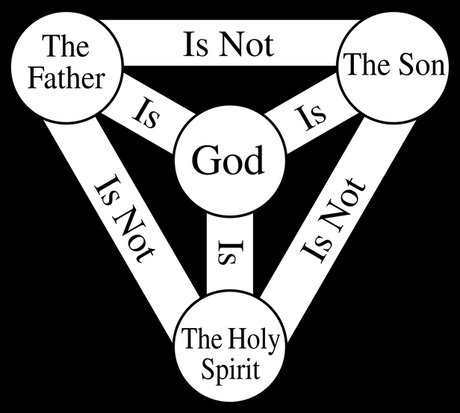Grace Thoughts
Teaching Notes: On Biblical Theology (Part 2)

Teaching Notes are Bible studies we taught before GraceLife Ministries began publishing articles online in 1995. Some were presented as sermons, others as group studies.
Our hope is that these older studies will be a blessing to you in your life and ministry. Please use them in any way God leads you.
These teaching notes are from a series of studies about Biblical Theology.
[These notes are from a study presented 45 years ago.]
We continue with our subject on Biblical Theology by looking closely at what the Bible teaches about God and the Kingdom of Jesus Christ. As we did in the first part of our study, we will include a list of other materials you can read that will augment your study of these wonderful topics.
The Eternal God
I. God is eternal. Isaiah 57:15
A. He always was
B. He is
C. He always will be
II. God is Three and One. Matthew 28:19-20; 1 Peter 1:2
A. God is Father, Son, and Holy Spirit
B. The Father, Son, and Holy Spirit are God

III. God is the Creator of all.
A. He created everything – Nehemiah 9:6
B. Everything was created for Him – Romans 11:36; Colossians 1:16
Christ’s Kingdom
We are using the text of two books to guide us in our study along with Scripture. They are –
- Erich Sauer’s From Eternity to Eternity
- Thomas Bernard’s The Purpose of Doctrine in the New Testament
We’ll now compare their viewpoints on Christ’s Kingdom.
I. Two Viewpoints on Christ’s Kingdom
A. The rule of Messiah will begin only at the setting up of His Kingdom in glory at His return in the End time.
B. The Davidic Kingship of Messiah began at the ascension and exaltation of the Divine Son of David to the right hand of the throne of the Majesty in the heavens.
II. Points of difference in the two viewpoints
A. The degree of this extension as regards what persons and lands are included .. to what extent Israel, to what extent the other nations.
B. The form of this rule, whether it will be only inward and spiritual or, in addition, visible and external, indeed, even historical and political.
C. The dating of this Davidic Kingship of the Son of David whether its commencement is to be placed at the ascension and Pentecost or only at the future parousias and epiphany.
III. Explanation of the “throne of David”
A. It is not literal as regards the rule of the Messiah.
B. It does not mean just the earthly national political “State” over which David ruled.
IV. Christ’s Kingdom will be of wider scope than David’s
A. Christ is Lord of the Church, which is made up of millions from every nation.
B. The Millennial Reign will place Christ as ruler over all nations.
C. Christ will rule men on earth and saints raised from the dead and glorified.
V. How Christ will set up His Kingdom
A. The judgment upon and destruction of the sinful kingdom of Israel.
B. The visiting by God of the Gentiles to take out of them a people for His Name.
C. The return of the Lord.
D. The rebuilding and raising up of the tabernacle of David.
E. The conversion to God of the residue of men, in connection with this restoration of Israel.
VI. Prophecy backs up the view of an earthly reign
A. Acts 15:13-17
B. Amos 9:8-10
C. Romans 15:7-9, 12
D. Isaiah 55:3
VII. The two viewpoints not irreconcilable
A. The current dispensation brings in a certain sense of fulfillment of many prophecies of the old covenant.
B. The prophesies have often a double and threefold fulfillment.
C. Christ is ruling over the lives of believers today and there will come a day when He will establish an earthly reign over all men.
VIII. The Decisive ground for expecting a Millennial Kingdom
A. The definite statements of the prophets concerning a future national reuniting of the two-tribes and ten-tribes kingdoms in the time of Messiah (Ezekiel 37:15-24; Hosea 1:11; Jeremiah 3:8; Zechariah 10:6)
B. The definite testimony of the prophets that in the time of Messiah, Israel will again dwell in the land of their fathers (Jeremiah 16:15), in their own land (Ezekiel 28:25), in this land (Jeremiah 32:41), into the land of Gilead and Lebanon (Zechariah 10:10).
C. The equally clear announcement that this will be effected only by its being associated with the glorious appearing of Messiah (Zechariah 14:4; Daniel 7:13-14; Matthew 24:30; 26:24; Revelation 1:5) and with the inward renewing of Israel (Hosea 3:5; Isaiah 4:4; 11:9; Ezekiel 36:26; Zechariah 13:1).
D. The announcement that there would be a conversion and renewal of the other nations (Isaiah 2:3-4; 19:23-25; Zephaniah 3:9; Zechariah 14:9; Malachi 1:11).
E. The God-given inspired interpretation of the dream visions of the Book of Daniel.
F. The unmistakable answer of Jesus to His disciples (Acts 1:6-8).
G. The testimony of the Revelation (Revelation 19:11-21; 20:4-6, 9-11).
The Apocalypse
In Bernard’s lecture on the Revelation of Christ, written by the Apostle John, Bernard shows a connection between the progress of prophecy and the progress of doctrine.
Bernard breaks the lecture into two main points with the second having six parts. The second point deals somewhat with the future Kingdom of Christ. He points out the doctrinal position of the book as being a doctrine of consummation. His six parts under this point are –
- A doctrine of the Cause of the consummation
- A doctrine of the History of the consummation
- A doctrine of the Coming of the Lord
- A doctrine of Victory
- A doctrine of Judgment
- A doctrine of Restoration
This sixth part deals somewhat with the last chapter of the first text by Sauer. Bernard points out that there will be a perfect humanity and perfect society. The New Jerusalem will be a fulfillment of the ancient promises of God.
Practical Application
I. The Kingdom of David to be Restored
A. II Samuel 7:8-16
B. Psalm 89:27-37
C. Isaiah 11:1-2
D. Jeremiah 23:3-6
E. Jeremiah 33:14-17
II. Jesus will rule on David’s throne
Luke 1:30-33
Other Available Study Materials
Coming Events in Prophecy, M.R. DeHaan, Zondervan, 1962 (Chapters 22 & 23)
Daniel, Oliver Greene, The Gospel Hour, 1964 (Chapters 2, 7-9, 11-12)
Daniel The Prophet, M.R. DeHaan, Zondervan, 1947 (Chapters 2, 4, 7-9, 1-12)
Revelation, Lehman Strauss, Loizeaux Brothers, 1964 (pp 329-344)
The Revelation, Oliver Greene, The Gospel Hour, 1963 (Chapters 19 – 22)
The True Messiah, Richard DeHaan, Radio Bible Class, 1974
This Same Jesus Is Coming Again, M.R. DeHaan, Radio Bible Class, 1962
God’s Program for Israel, Theodore Epp, Back To the Bible, 1968
Earth’s Coming Golden Age, A.E. Logan, Georgia Bible Institute, 1973
1,000, Salem Kirban, 1973
The Late Great Planet Earth, Hal Lindsey, Zondervan, 1970
Profiles of Prophecy, Franklin Logsdon, Zondervan, 1970 (Chapters 16 – 21)
The Coming Kingdom of Christ, John Rice, Sword of the Lord, 1945 (Chapter 8)
Systematic Theology, Henry C. Thiessen, Eerdmans Publishing, 1949 (Chapters 41 – 42, 45 – 47)
The Olivet Discourse, Carl Armerding, Dunham Publishing, 1955
Next Time
In the next part of our study on Biblical Theology, we will look at the present complete salvation we have in Jesus Christ.


Published by gracelifethoughts
Founder & Director of GraceLife Ministries View all posts by gracelifethoughts
